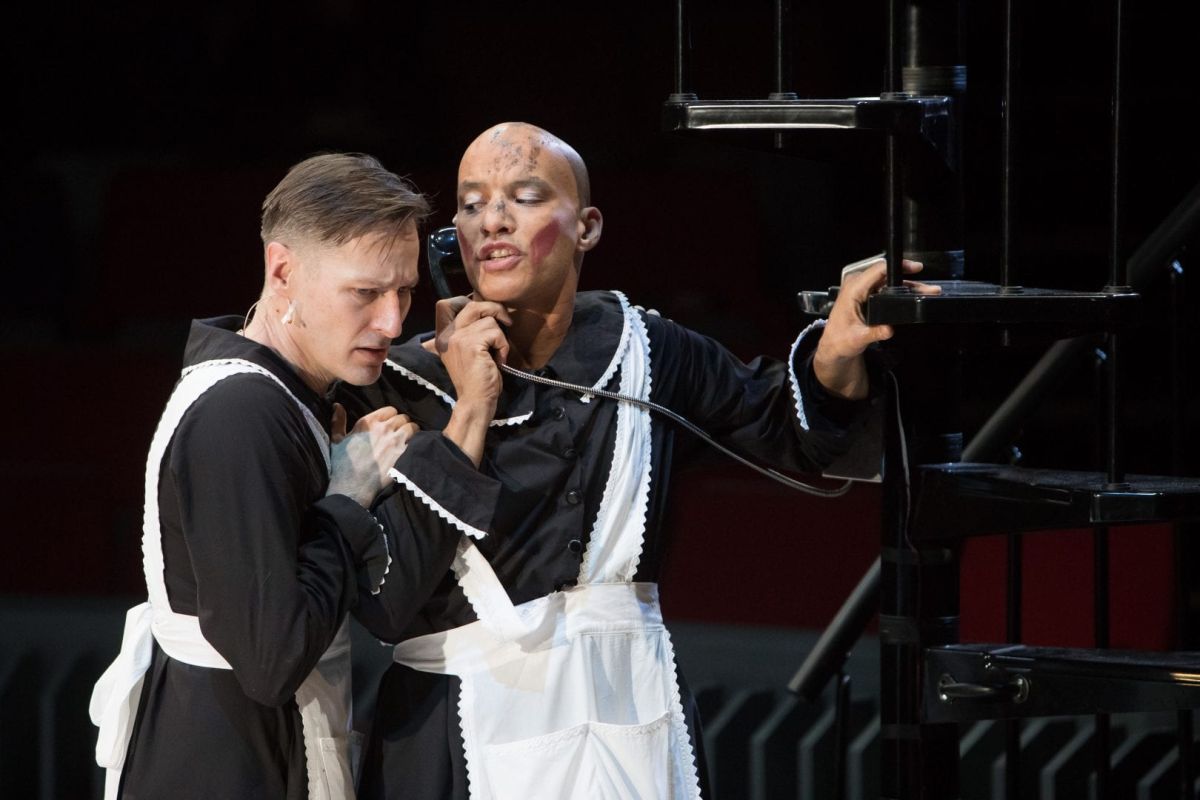Review: The Maids
By Jay Darcy and Anuli Changa

‘The Maids’ is a radical play, in content, characterisation, and direction; based on the true story of the Papin sisters, who murdered their employer and her daughter, it was written by Jean Genet whilst he was in prison. With the quote from Genet, “maybe the characters are me, maybe they’re not” projected on a double-sided screen, combined with the male actors taking on female roles, the presence of the male writer is felt onstage. This is furthered by the prison uniforms that the actors wear at times.
One of the most surprising aspects of this play was the decision to cast the three female characters with male actors. Whilst the three male actors softened their voices and referred to themselves as women, their masculinity is not masked. All three men displayed beautiful characterisation and an ability to show the power shift between their characters. The physicality differences displayed when the maids (Solange and Claire) played by Jake Fairbrother and Luke Mullins were in the presence of their Mistress or not was stark and unnerving. This disregard for the binary of gender is just one example of the play’s refusal to conform to social norms.
‘The Maids’ marks HOME’s first ‘in-the-round’ performance, raising the stage to the level of the circle; this helped include the audience in the story, and it slowly becomes clear that we, the audience, and society, are part of the story.
It almost felt like we had been transported into Genet’s creative, sometimes disturbing, mind. When she was interviewed by the Mancunion, Sykes previously explained that the all-male casting also allowed the two male characters, (the milkman and the lover) who are alluded to but not seen, to be “present” onstage.
The play challenges many boundaries, from gender to class, and the misunderstandings that people from one group have about the people of the other. The Mistress (Danny Lee Wynter) was self-centred, but not necessarily wicked — rather, ignorant. She, too, is trapped in the role society has cast her as, and perhaps the gender-bending of the role signifies a desire to not have to perform or conform any longer.
Sykes makes it clear that it is not just the rich who have a disregard for, and a misunderstanding of, the poor. Fairbrother and Mullins played the maids with delicious deviousness and a daring desire to be rich and classy like their Mistress. They soon discover, however, that their Mistress’s fancy life is not so perfect, but it becomes clear that what the maids truly want is freedom and liberation. But from what? That’s up for interpretation. Perhaps from their dull, mundane lives, or perhaps Sykes wants us to think about sexual liberation and the restrictive constructs of identity.
The audience experienced the maids taking turns dressing up as their Mistress and practising killing her. The maids slipped in and out of their fantasy roles and true identities (which are perhaps constructed themselves), blurring the line between fiction and reality.
‘The Maids’ design (Ruari Murchison) was incredible! The stage floor was a large white circle within a black one, like a target. This imagery was continued with fake flowers affixed with darts so they stuck into the floor. Furthermore, the use of a video camera, with the images projected on the screen, created a whole new dimension to the class incarceration experienced by all three women. The stream of sand falling from the roof of the theatre, representing an hourglass signalled that time is always running out, not just for the completion of the maids’ murderous performances, but the maids themselves.
In a society where we care so much about self-perception, perhaps we get carried away and do not focus on the things that truly matter. Politics has become more divisive in recent years; Trump and Brexit have created a need for escapism from social imprisonment that is just as relevant today as when Genet was writing. ‘The Maids’ perfectly captures a social and cultural desire to resist and revolt, it is a triumph of direction, design and performance, demanding that we question the world we live in.







